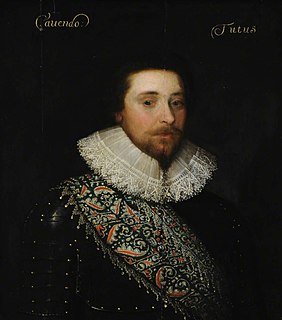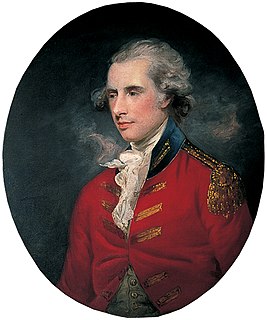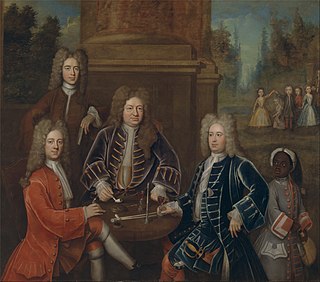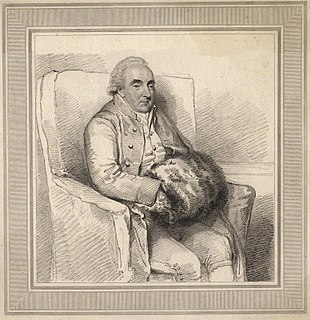Godfrey Bagnall Clarke (c.1742-26 December 1774), of Sutton Scarsdale Hall in Derbyshire, was a British Member of Parliament, representing Derbyshire.

Sutton Scarsdale Hall is a Grade I listed Georgian ruined stately home in Sutton Scarsdale, just outside Chesterfield, Derbyshire.

Derbyshire is a county in the East Midlands of England. A substantial portion of the Peak District National Park lies within Derbyshire, containing the southern extremity of the Pennine range of hills which extend into the north of the county. The county contains part of the National Forest, and borders on Greater Manchester to the northwest, West Yorkshire to the north, South Yorkshire to the northeast, Nottinghamshire to the east, Leicestershire to the southeast, Staffordshire to the west and southwest and Cheshire also to the west. Kinder Scout, at 636 metres (2,087 ft), is the highest point in the county, whilst Trent Meadows, where the River Trent leaves Derbyshire, is its lowest point at 27 metres (89 ft). The River Derwent is the county's longest river at 66 miles (106 km), and runs roughly north to south through the county. In 2003 the Ordnance Survey placed Church Flatts Farm at Coton in the Elms as the furthest point from the sea in Great Britain.
Derbyshire is a former United Kingdom Parliamentary constituency. It was a constituency of the House of Commons of the Parliament of England then of the Parliament of Great Britain from 1707 to 1800 and of the Parliament of the United Kingdom from 1801 to 1832. It was represented by two Knights of the Shire.

He was the eldest son of Godfrey Clarke and his wife Anne, the daughter and heiress of German Pole of Radbourne, Derbyshire and undertook the Grand Tour to Italy. [1]
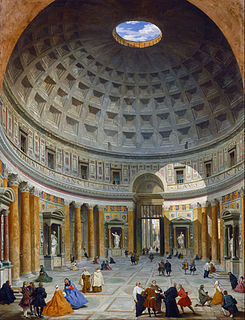
The term "Grand Tour" refers to the 17th- and 18th-century custom of a traditional trip of Europe undertaken by upper-class young European men of sufficient means and rank when they had come of age. Young women of equally sufficient means ("debutantes"), or those of either gender of a more humble origin who could find a sponsor, could also partake. The custom—which flourished from about 1660 until the advent of large-scale rail transport in the 1840s and was associated with a standard itinerary—served as an educational rite of passage. Though the Grand Tour was primarily associated with the British nobility and wealthy landed gentry, similar trips were made by wealthy young men of other Protestant Northern European nations, and, from the second half of the 18th century, by some South and North Americans. By the mid 18th century, the Grand Tour had become a regular feature of aristocratic education in Central Europe, as well, although it was restricted to the higher nobility. The tradition declined as enthusiasm for neo-classical culture waned, and with the advent of accessible rail and steamship travel—an era in which Thomas Cook made the "Cook's Tour" of early mass tourism a byword.
Clarke was elected to Parliament in 1768, winning a contested election (a rare event in Derbyshire) to beat one of the sitting MPs, Sir Henry Harpur. Clarke's personal politics are unknown, and he seems never to have spoken in the House of Commons, but he was supported by the Derbyshire Tories and voted consistently with the opposition. He was re-elected unopposed in October 1774 but was already ill, and died only two months later, unmarried and in his early thirties.

Sir Henry Harpur, 6th Baronet was an English Tory politician who represented the constituency of Derbyshire.
His estates at Sutton, Chilcote Hall and Somersall Hall passed to his sister who married Joseph Hart Pryce (Clarke from 1787) and then to their daughter Anna Maria Clarke who married Walter Butler, 18th Earl of Ormonde.
Somersall Hall is a small country house near Brampton, Chesterfield, Derbyshire. It is a Grade II listed building.
Walter Butler, 1st Marquess of Ormonde, KP was an Irish peer and politician. Partly to sustain his extravagant lifestyle, Walter gave up his hereditary right to the grant of the prisage of the wines of Ireland for an enormous sum of money. The right had been made to the 4th Chief Butler of Ireland by Edward I of England. Between 1789 and 1796, he sat for Kilkenny County in the Irish House of Commons.
Clarke was a great friend of the historian Edward Gibbon, whom he met while on the Grand Tour, and Gibbon executed his will.

Edward Gibbon FRS was an English historian, writer and Member of Parliament. His most important work, The History of the Decline and Fall of the Roman Empire, was published in six volumes between 1776 and 1788 and is known for the quality and irony of its prose, its use of primary sources, and its polemical criticism of organised religion.

